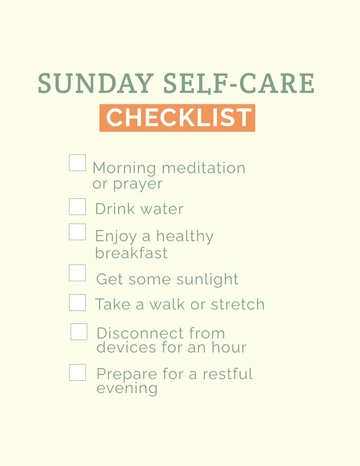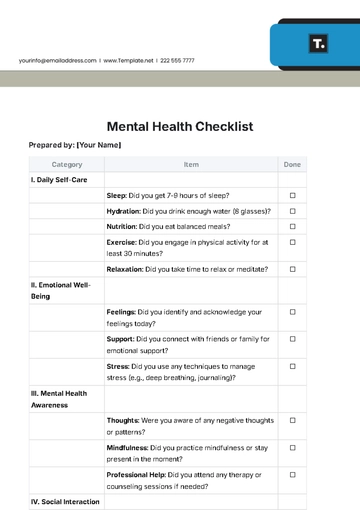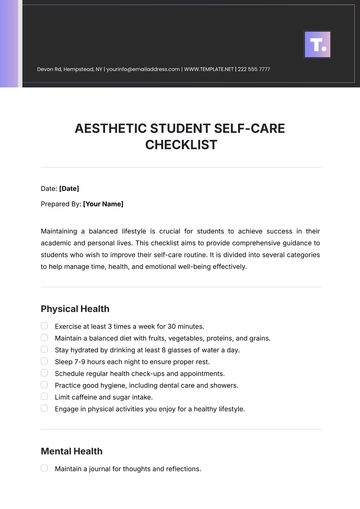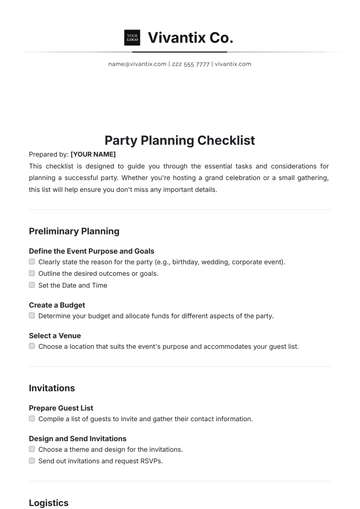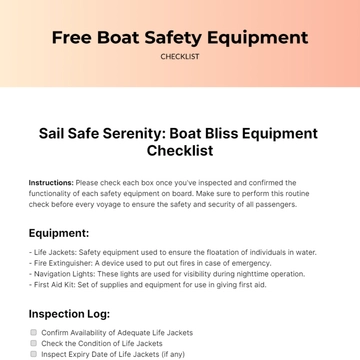Free Aesthetic Student Self-Care Checklist
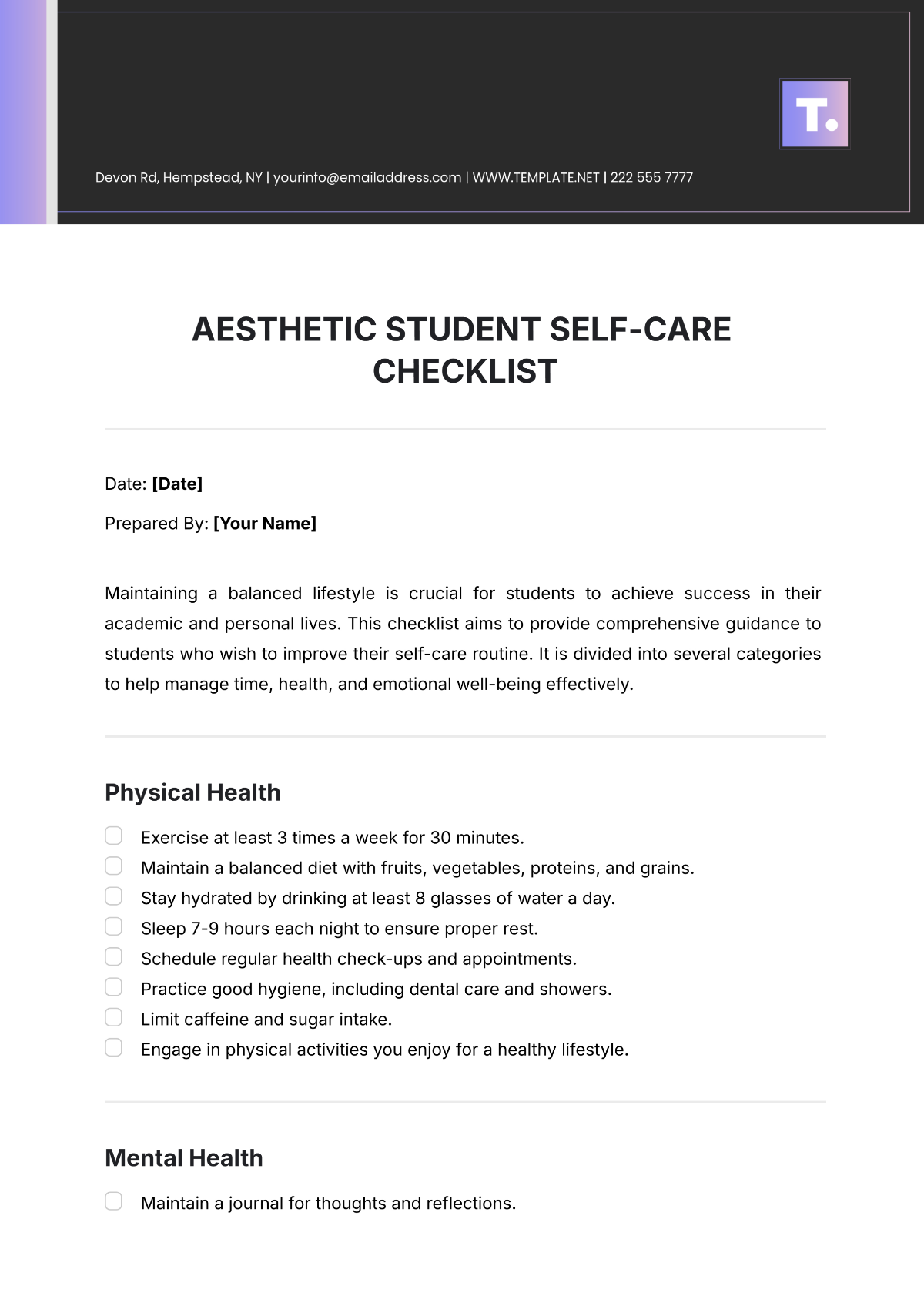
Date: [Date]
Prepared By: [Your Name]
Maintaining a balanced lifestyle is crucial for students to achieve success in their academic and personal lives. This checklist aims to provide comprehensive guidance to students who wish to improve their self-care routine. It is divided into several categories to help manage time, health, and emotional well-being effectively.
Physical Health
Exercise at least 3 times a week for 30 minutes.
Maintain a balanced diet with fruits, vegetables, proteins, and grains.
Stay hydrated by drinking at least 8 glasses of water a day.
Sleep 7-9 hours each night to ensure proper rest.
Schedule regular health check-ups and appointments.
Practice good hygiene, including dental care and showers.
Limit caffeine and sugar intake.
Engage in physical activities you enjoy for a healthy lifestyle.
Mental Health
Maintain a journal for thoughts and reflections.
Practice mindfulness or meditation for stress relief.
Limit screen time, especially before bedtime.
Seek professional mental health support when needed.
Engage in creative activities such as drawing or music.
Practice gratitude by listing things you are thankful for.
Identify stress triggers and develop coping strategies.
Engage in regular leisure activities to relax.
Time Management
Create a daily schedule and prioritize tasks.
Break major tasks into smaller, manageable parts.
Limit distractions during study time.
Set short and long-term goals for academic success.
Use productivity tools to keep track of tasks and deadlines.
Allocate specific times for study, rest, and leisure.
Regularly review and adjust time management strategies.
Take regular breaks to enhance focus and productivity.
Social Connections
Reach out to friends and family regularly.
Join clubs or organizations to meet new people.
Attend social events and gatherings.
Volunteer for causes you are passionate about.
Establish a support network for difficult times.
Communicate effectively and practice active listening.
Set boundaries to maintain healthy relationships.
Engage in meaningful conversations with peers.
Emotional Well-being
Identify emotions and express them healthily.
Practice self-compassion and avoid negative self-talk.
Find hobbies that bring joy and relaxation.
Balance work-life commitments to reduce stress.
Seek emotional support when feeling overwhelmed.
Reflect on positive experiences and achievements.
Set realistic expectations and goals.
Practice relaxation techniques such as deep breathing.
Financial Wellness
Create and maintain a budget tailored to your needs.
Track your spending to identify patterns and areas to cut back.
Consider part-time employment or freelance work for income.
Research and apply for scholarships or financial aid.
Seek financial advice from experts when necessary.
Avoid unnecessary credit card use and debt.
Make saving a habit, even if in small amounts.
Plan for major expenses ahead of time.
Academic Success
Attend all classes and participate actively.
Develop effective study habits and techniques.
Create a dedicated and distraction-free study space.
Use scholarly resources and libraries efficiently.
Form study groups for collaborative learning.
Ask for help from instructors or tutors when needed.
Stay organized with assignments and deadlines.
Review notes regularly to reinforce learning.
Additional Reminders
Check-in with yourself regularly to assess all aspects of well-being.
Adjust the checklist to suit your individual needs and circumstances.
Set realistic, achievable goals, and celebrate your accomplishments.
Remember that self-care is a continuous journey, not a one-time task.
Allow for flexibility and personal growth within your self-care practices.
Don't hesitate to seek support from friends, family, or professionals.
- 100% Customizable, free editor
- Access 1 Million+ Templates, photo’s & graphics
- Download or share as a template
- Click and replace photos, graphics, text, backgrounds
- Resize, crop, AI write & more
- Access advanced editor
The Aesthetic Student Self-Care Checklist Template, offered by Template.net, is a customizable, downloadable, and printable resource designed to help students prioritize their well-being. With an aesthetically pleasing layout, this checklist is fully editable in our AI Editor Tool, allowing you to tailor it to your needs. Stay organized and stress-free with this essential self-care tool that helps maintain balance and focus throughout your studies.
You may also like
- Cleaning Checklist
- Daily Checklist
- Travel Checklist
- Self Care Checklist
- Risk Assessment Checklist
- Onboarding Checklist
- Quality Checklist
- Compliance Checklist
- Audit Checklist
- Registry Checklist
- HR Checklist
- Restaurant Checklist
- Checklist Layout
- Creative Checklist
- Sales Checklist
- Construction Checklist
- Task Checklist
- Professional Checklist
- Hotel Checklist
- Employee Checklist
- Moving Checklist
- Marketing Checklist
- Accounting Checklist
- Camping Checklist
- Packing Checklist
- Real Estate Checklist
- Cleaning Checklist Service
- New Employee Checklist
- Food Checklist
- Home Inspection Checklist
- Advertising Checklist
- Event Checklist
- SEO Checklist
- Assessment Checklist
- Inspection Checklist
- Baby Registry Checklist
- Induction Checklist
- Employee Training Checklist
- Medical Checklist
- Safety Checklist
- Site Checklist
- Job Checklist
- Service Checklist
- Nanny Checklist
- Building Checklist
- Work Checklist
- Office Checklist
- Training Checklist
- Website Checklist
- IT and Software Checklist
- Performance Checklist
- Project Checklist
- Startup Checklist
- Education Checklist
- Home Checklist
- School Checklist
- Maintenance Checklist
- Planning Checklist
- Manager Checklist
- Wedding Checklist
- Vehicle Checklist
- Travel Agency Checklist
- Vehicle Inspection Checklist
- Interior Design Checklist
- Backpacking Checklist
- Business Checklist
- Legal Checklist
- Nursing Home Checklist
- Weekly Checklist
- Recruitment Checklist
- Salon Checklist
- Baby Checklist
- Equipment Checklist
- Trade Show Checklist
- Party Checklist
- Hospital Bag Checklist
- Evaluation Checklist
- Agency Checklist
- First Apartment Checklist
- Hiring Checklist
- Opening Checklist
- Small Business Checklist
- Rental Checklist
- College Dorm Checklist
- New Puppy Checklist
- University Checklist
- Building Maintenance Checklist
- Work From Home Checklist
- Student Checklist
- Application Checklist
